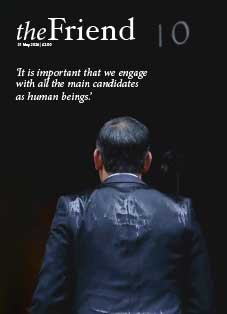
The Friend is a weekly magazine in which Friends speak to each other and to the wider world, offering their insight, ideas, news, nurture and inspiration.
Nurturing Quaker community, each issue offers a space for Friends to share their concerns, and to support each other in faith and witness.
The Friend: enriching, inspiring and connecting the Quaker community since 1843.
In Roger Lipsey’s book Gurdjieff Reconsidered, an exploration of the quintessential Western esoteric teacher of the twentieth century, there is reference to Katherine Mansfield’s visit to The Prieuré, a former priory where Gurdjieff had established his Institute for the Harmonious Development of Man. Mansfield, a modernist writer and critic, had tuberculosis, and spent her last years seeking a cure. She eventually suffered a fatal pulmonary haemorrhage at The Prieuré, and Gurdjieff’s reputation suffered – unfairly, according to contemporary accounts. But in fact Lipsey records that Mansfield’s impression was very positive, and the quality that struck her there most forcibly was honesty.
Timely Meeting
More than fifty-five Friends gathered online on 22 May for a Meeting for Sufferings (MfS) preparation advocacy session about the upcoming general election.
The session was clerked by Elizabeth Allen, assistant clerk for MfS, who started the Meeting by saying how ‘amazing’ and ‘timely’ it was that the Meeting should come on the day that the prime minister Rishi Sunak announced there would be a general election on 4 July.
It was also a ‘special Meeting’, she said, as MfS had been encouraged to experiment with the way it works. Friends who were not appointed Area Meeting representatives were welcome to attend.
‘We realised that the subject matter… was of very wide interest, far beyond the interest of MfS representatives, so wanted to widen the availability,’ she said.
Quakers took part in protests this month to prevent the return of US nuclear weapons to USAF Lakenheath.
During the Week of Prayer for Christian Unity in January, I asked the minister of a local active church why that church had refused to allow the local Palestine Group to meet there. He went pale, took a few steps back, and said well, it is too political. In further conversations during that week, other clergy admitted to me that their congregations were split on the issue, and they couldn’t identify a way forward. Most of them simply didn’t address the issue in their churches at all, as they found it too divisive and difficult.
War gatecrashed the journal of the US Quaker John Woolman on the ninth of August 1757.
As part of the French and Indian war that was raging at the time, the French commander Louis-Joseph de Montcalm marched on the British-held Fort William Henry in the province of New York at the end of July that year, with a force of over 8,000 men. In and around the fort, the British could only boast about a third of that number.
I was impressed by the powerful ‘A different future is possible: Quaker organizations share a vision for peace in Palestine and Israel’ statement signed by American Friends Service Committee, Quaker United Nations Office and others, including our own Yearly Meeting. In fact, when it first came to my attention I asked my Meeting to consider signing it. But I’ve since re-read it several times, and have felt a sense of unease growing.

Become a subscriber to enjoy unlimited access to our articles, dating back to 2009! Online subscribers get the Friend to their inbox each week, can comment on articles, and dive into our 1914-18 digital archive too!
Whether you are new to Quakerism or have been going to Meeting for years, you’ll find something here to inspire, inform and challenge you.
News | Views | Reviews
Written by and for Friends on the bench
Subscribe